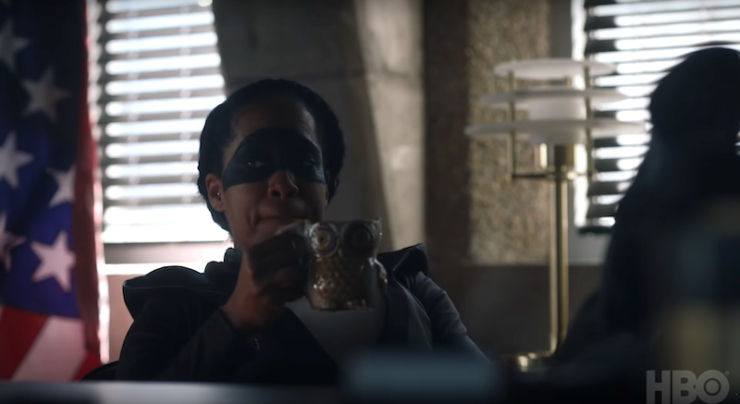Fantasy and Sci-Fi has always been political, which is why I was surprised that Watchmen’s overt approach to race ruffled the feathers of many viewers. Science fiction has a way of teaching us about ourselves while giving us some distance between our face and the mirror. Watchmen may have turned up the volume, but the presence of politics is neither a betrayal of the original graphic novel or the genre itself.
The riveting first fifteen minutes of episode one, “It’s Summer and We’re Running Out of Ice”, depict the brutal Black Wall Street massacre that happened in Tulsa, Oklahoma in 1921. Writers Damon Lindelof and Nick Cuse do so much more than shine a light on America’s race problem. They show that this massacre, like so many in America’s history, led to generational trauma and displaced children, forcing people to create new families of their own. By doing so, they dismantle the adoption trope as one that belongs solely to white heroes while at the same time paralleling the unknowns that often exist in African-American lineage. The grim reality is that because of events like the Tulsa massacre, the Trans-Atlantic slave trade, and the Reconstruction era that followed it, there are many dead ends in African-American genealogy.
For comic books in particular, adoption is not a foreign story device. We see it in Batman, Spider-man, and Superman, to name a few. Whether it’s private adoption or kinship adoption, adoptive or found family plays a considerable role in the superhero origin story. What we haven’t seen until now is a Black heroine who is a happily married, adoptive mother with a murky origin story of her own.
[Some spoilers ahead for Watchmen]
As a viewer of Watchmen, I can relate to Angela Abar and how she came to be a mother of three children. Our stories are not identical, but adoption, even when consensual, always involves some thread of loss. After her partner, Doyle and his wife were murdered, Angela and Cal adopt their three children. The writers don’t lead with the adoption narrative. Instead, we see Angela greet her children on her front lawn while displaying a deep emotional connection. Several months ago, I attended an open house at my daughter’s daycare. One of the teachers in the infant room gazed at my daughter and said, “she’s the perfect combination of you two.” “Thank you,” I said. My daughter smiled back while squirming and kicking her legs. “Did she kick you a lot, dear?” I started to answer yes, because yes was easier. Then I hesitated. There was no reason for me to be dishonest; this woman would be responsible for caring for my child for the next year. “No”, I said. “She’s adopted.”
Watchmen demonstrates how nuanced our heroes and villains are in both in their vigilante pursuits and in their unmasked day-to-day. Like Sister Night, their worlds are colored by more than good and evil. They are made more complex by fear, secrets, passion, and self-doubt. They read like case studies of human behavior with elaborate aliases and advanced technology thrown in for effect.
In the age of 23andMe and Ancestry.com, it’s not hard to imagine a world where a museum like the Greenwood Cultural Center would exist, or technological advances that would allow citizens to trace their family tree in a matter of hours. Twenty years ago, I fell in love with genealogy in an effort to learn more about my maternal grandmother. Adopted at the age of two or three, there was little known about her birth parents, her siblings, or how she came to settle in a small town in northwest Pennsylvania. Relying on census records, county biographies and city directories, I traced my mother’s side back six generations until I reached a dead end. Like Angela, connecting the dots became an obsession that was also laced with caution.
Buy the Book


Riot Baby
The caution, I would learn, was triggered by the fear that family secrets would be revealed and that would make us vulnerable and alter our public perception. Like Angela, she has secrets of her own and narratives she is not yet privy to. She’d rather, for the sake of her own psyche, stay behind the mask and protect herself from exposure. When Angela meets Will, who is later revealed to be her grandfather, she suspects his involvement in the murder of her friend and police chief, Judd Crawford. Concealing his existence while at the same time embarking on her own investigation of Judd and Will is a very real threat to her innocence and to a greater extent her ignorance about who these flawed men are. She fears what she doesn’t know, and pursues it anyway.
In episode four, “If You Don’t Like My Story, Write Your Own”, Angela breaks into the Greenwood Cultural Center to see her family tree. After taking her encoded acorn to the virtual greenhouse to see the results, she learns who her great-grandparents and their fate on the day of the Tulsa Massacre. After going to such great lengths to find the missing pieces. She directs her anger at the photo of her grandfather who just walked back into her life. “You said you wanted me to know where I came from. Now I know, so wherever you are, leave me the f*ck alone.” Angela’s visceral reaction to the truth reminds me of how my own family reacted to my sudden interest in my ancestors. My curiosity was met with defensiveness and hostility rather than support. Throughout my own research, I came to understand my elders’ negative reaction to my probing. For the majority of African-Americans, nostalgia for the good ol’ days simply does not exist. There is no wistful longing for how things were back in the 1950s or at the turn of the 20th century. Jim Crow and hate crimes against Black people were rampant. At the end of episode five, “Little Fear of Lightning”, these imagined threats become a reality when she is arrested for covering up the scene of the crime where Judd was murdered. The Watchmen series uses fear of nostalgia to hold a reflection to our own difficult relationship with the past.
Angela’s nostalgia is familial, for police Judd Crawford it’s his racist past, and for the citizens of Tulsa, nostalgia reminds us of the massacre that took place almost a century ago. What’s unsettling is this piece of Watchmen is a very real piece of our own American history—a page from the past that many people didn’t know about and wish they could forget.
So why the outcry about too much politics in Watchmen? Because in real life we are mired in it. The series doesn’t give us much distance from the constant revelations of our 24-hour news cycle. The sun rises and sets with hearings, headlines, and tweets. Instead of escapism, Watchmen presents a study of what we as Americans—especially in today’s climate—are having to wrestle with on a daily basis. We question our heroes and leaders, we doubt the veracity of lawmakers’ motives and we cringe over the mistakes of our peers and mentors. But most of all, when we choose to seek answers about our life path, our introspection forces us to revisit the past.
I think some of the viewers uncomfortable with the direction of Watchmen are really responding to their own fear of the past. The inherited trauma we see in this series is enmeshed in both the found family narrative and the decisions of our heroes and ancestors. They’d rather look forward then make amends with an ugly chapter in America’s history that has not been embellished for dramatic effect. Watchmen asks us to take off the mask and to take a deep look at what our history tells us about ourselves, our blood family, our adoptive family and those who should have the best interest of our families.
Sakena Jwan Washington is a writer from Pittsburgh. Her writing has appeared in Huffington Post, ReWire News, Brevity, and In the Fray Magazine. She received her MFA in creative writing from Antioch University, Los Angeles. She works in academia as a digital content manager.










